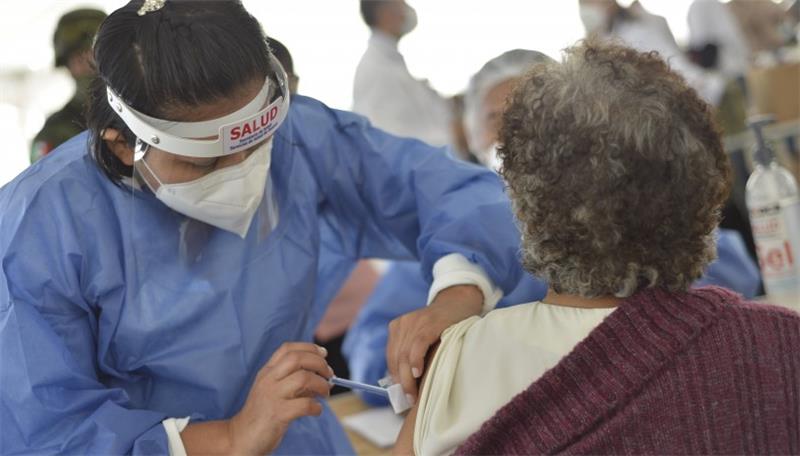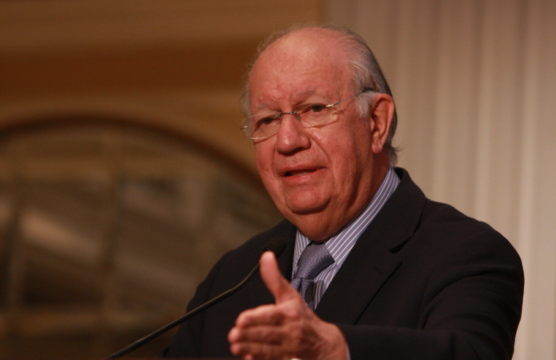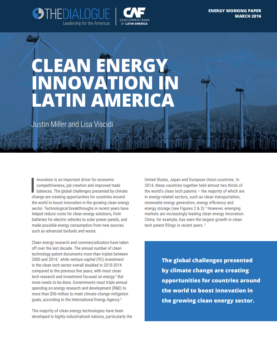Industrial Policy & Innovation in Brazil
Despite an increased presence in the global market, Brazil’s new economic policy shows sign of protectionism and defense of traditional industries.
A Daily Publication of The Dialogue
The administration of U.S. President Joe Biden on May 5 announced its support for waiving intellectual property protections for patents on Covid-19 vaccines. A proposal at the World Trade Organization would suspend some of the protections, allowing drug companies to access trade secrets on how the vaccines are made. Should the protections be lifted, and what would such a move mean for Latin American and Caribbean countries’ efforts to inoculate their populations? What else can be done to boost vaccine manufacturing and supply on a global scale? What effect would such waivers have on the prevalence of counterfeit Covid-19 vaccines, and what would setting this precedent mean for the pharmaceutical industry at large? How likely is the proposal to be adopted at the WTO now that the Biden administration is supporting it, and how soon could the decision be made?
James Fitzgerald, director of the Health Systems and Services Department at the Pan American Health Organization: “Ensuring equity in access to medicines and health technologies—including lifesaving Covid-19 vaccines—is central to ending the pandemic. To this end, it is important that we examine every possible option available to us to rapidly expand access and coverage to Covid-19 vaccines, including increasing manufacturing capacity in Latin America and the Caribbean. Current vaccine manufacturing capacity in this region is low and is concentrated in a few countries; investment in research and development has been inadequate, with insufficient priority given to establishing the enabling conditions necessary to increase the production base, including the participation of the private sector. Technology-transfer agreements to increase capacity to date have not benefited the region as a whole. Political commitment is needed across the region to address these issues through joint action of countries, increased financing for research and development, updating and amplifying productive capacity, strengthening regulatory systems, and partnerships across health, industry and science and technology sectors, and across public and private sectors, including academia. The region is moving in this direction, and with the support of PAHO/WHO, it is exploring options to access modern adaptable vaccine development platforms that will increase capacity for the future. Access to technology will be critical to the success of this endeavor in the midterm, through more inclusive voluntary technology-transfer agreements that address regional needs, through the application of TRIPS flexibilities confirmed in the DOHA Declaration, or indeed through an alternative process that waives existing regulations through the World Trade Organization. This pandemic clearly shows us that the world needs a new treaty that can guarantee equitable access to vaccines, medicines and other tools that countries need to respond appropriately. Working together, we can be better prepared for the future, we can generate capacity for the future and we can ensure greater equity in our collective response against future pandemics.”
Rolf Hoenger, area head for Latin America at Roche Pharma: “In less-developed regions such as Latin America, health systems face infrastructure deficiencies that affect the delivery of essential health services to all, ranging from restricted supply chains to a shortage of trained professionals. These are the same challenges that are interfering with Covid-19 vaccines and many other innovations getting to people faster, and suspending patent rights won’t solve such a complex issue. The developer of an innovation has the established production facilities as well as the technical and medical know-how to ensure high-quality products and patient safety, even when responding to emergency situations. Waiving patent protections for difficult-to-make pharmaceutical products in a scenario of strained supply chains can lead to a disrupted, rather than increased, supply of safe products. Such a decision for Covid-19 vaccines can also set a dangerous precedent for the industry, disincentivizing the innovation we need to solve unmet medical needs. As economics teaches us, providing incentives is an effective way to boost manufacturing and supply of vaccines and other innovations. Instead of looking at patents, we should focus on enabling more public-private partnerships. This has been our approach at Roche to contribute during the pandemic: we quickly reacted to develop Covid-19 tests, explore the potential of our portfolio to treat the virus and help scale production, including collaborations with other laboratories such as Regeneron and Novartis, and we continue working with health care providers, authorities and other organizations to ensure we can meet the demand for our products and patients are getting the care they need.”
Núria Homedes, executive director of Salud y Fármacos: “Everybody agrees that the Covid pandemic will not end until everyone is vaccinated and the emergence of virus variants is contained. A more difficult question is how to get there. WHO and other global players established mechanisms to share intellectual property and funds to ensure that low- and middle-income countries would have access to Covid vaccines and treatments, but they failed to earn meaningful support from most advanced economies and the pharmaceutical innovative industry. It might be that relying on volunteerism can’t work when there are large profits to be made and governments feel the urge to respond to the short-term needs of their constituencies. However, the response to the pandemic is reminiscent of what happened to the AIDS community in the 1990s and has tragically exposed the failure of the current pharmaceutical development and production model to provide equitable access to lifesaving treatments, even when doing so would be in everybody’s best interest. Waiving IP rights is one step in the right direction, but it might be too late for it to have a meaningful effect. Sadly, it will take months for countries within the WTO to negotiate the final text, and it is doubtful that powerful countries that house big pharmaceutical companies will support the initiative. On the bright side, the waiver signals to local manufacturers that they could have a market, which might spark their interest in updating their plants and technology. Their success will also require a major global effort at technology transfer and the elimination of access barriers to raw materials. Hopefully, we can extract some lessons and develop pharmaceutical policies more responsive to basic ethical standards. Profits cannot be made at the expense of avoidable deaths.”
Brian Toohey, senior vice president for international advocacy at the Pharmaceutical Research and Manufacturers of America (PhRMA): “Biopharmaceutical manufacturers are fully committed to providing global access to Covid-19 vaccines. After more than 200 clinical trials and nearly 300 partnerships and collaborations among manufacturers worldwide, global production has increased in just a few months from zero to 2.2 billion Covid-19 vaccine doses by the end of May, with an estimate of approximately 11 billion doses by the end of 2021. But there is an urgent need for solutions to meaningfully promote vaccine equity, especially in some countries throughout Latin America. What will not address the underlying causes of vaccine inequities is undermining intellectual property protections through any waiver of the World Trade Organization Agreement on Trade-Related Aspects of Intellectual Property Rights (TRIPS). A waiver would sow confusion, further weaken already strained supply chains and foster the proliferation of counterfeit vaccines. There are real challenges to getting more shots in arms, including last-mile distribution and the free flow of inputs and finished products, and these won’t be addressed by an IP waiver. We all must work together to address these barriers. While officials in Geneva debate anti-innovation policies that won’t help save lives now in Latin America or beyond, the biopharmaceutical sector will remain focused on the shared objective of vaccinating people around the globe as quickly as possible and ending the pandemic. We’ve seen more American vaccine exports in recent days, increased production targets from manufacturers and new commitments to Covax. We all must continue working together to beat Covid-19.”
Jaci McDole, senior analyst for intellectual property and Innovation at the Information Technology and Innovation Foundation: “Waiving IP rights doesn’t solve the real problem. There’s a global lack of infrastructure and raw materials as well as shortages and bottlenecks within the supply chain. It takes at least six months before new manufacturers can begin production. Waiving IP protections also exacerbates an existing problem, as counterfeits are often discovered by tracking the supply chain through IP-enabled licensing agreements, trademarks, trade secrets and other forms of IP. The prevalence of counterfeits and subpar products increases mistrust, undermining public confidence in vaccines. Including trade secrets in the waiver opens the flood gates, so the pharmaceutical industry can’t recover those investments. It’s also easier for counterfeiters to undermine continued treatments and vaccinations after the pandemic has abated. But the waiver isn’t limited to vaccines and therapeutics; anyone who invested in research and development to combat Covid-19 loses, making companies less inclined to invest their resources in the future if they know it’s likely to be taken from them. If certain countries hold out, the waiver won’t go through any time soon. Even if it did, it would take months of negotiation before terms are reached. Meanwhile, several countries and manufacturers are contributing to Covax and other initiatives serving developing and underserved regions. What is needed is for governments to reduce regulatory delays, reduce import and export restrictions, identify potential manufacturing partners and shore up their distribution infrastructure. Western governments can also invest and facilitate building out the public and distribution infrastructures in developing countries. Supplies don’t matter if they don’t get to the people who need them.”
Andrew Rudman, director of the Mexico Institute at the Woodrow Wilson International Center for Scholars: “The decision to support a WTO waiver for the intellectual property rights (IPR) covering Covid-19 vaccines, which represents a significant shift from the United States’ traditional position, has garnered praise from many countries that have consistently sought to weaken IPR protection for medicine. Despite the enthusiasm, the decision is unlikely to have a meaningful impact on vaccination efforts, even if the predictions of a six-month WTO negotiation prove wildly pessimistic. The vaccination challenges facing Western Hemisphere governments have little to do with the innovators’ intellectual property, even though the mRNA technology behind the Pfizer/BioNTech and Moderna vaccines is novel and may prove able to treat numerous known and unknown viruses and other conditions. Impediments to Covid-19 vaccine production include global shortages of key ingredients and lack of manufacturing capability, even in developed countries such as Canada, and a lack of an adequately trained work force. Further, the 2001 WTO Doha Declaration already provides countries with the necessary flexibilities to protect public health including the right to issue a compulsory license even when they lack domestic production capability—a provision that Bolivia recently invoked. Co-production efforts such as the Argentine-Mexican project to produce 250 million doses of AstraZeneca’s single-dose vaccine are likely to be far more effective at addressing the current crisis that will be negotiation of new flexibilities. Governments can implement a number of short- and long-term policies, including fiscal incentives to promote increased production of precursor chemicals and investment in manufacturing capacity through guaranteed purchase contracts, for example. In the longer term, education systems should prioritize training to create a work force able to staff advanced vaccine production facilities. All of these would enhance regional preparedness for future pandemics and existing health challenges.”
 The Latin America Advisor features Q&A from leaders in politics, economics, and finance every business day. It is available to members of the Dialogue’s Corporate Program and others by subscription.
The Latin America Advisor features Q&A from leaders in politics, economics, and finance every business day. It is available to members of the Dialogue’s Corporate Program and others by subscription.
Despite an increased presence in the global market, Brazil’s new economic policy shows sign of protectionism and defense of traditional industries.
Latin America inequality gap, economic integration, and infrastructure and education systems were among the issues spotlighted at the XVII Annual CAF Conference.
In the wake of the COP21 global climate talks, governments must shift attention to how they will actually follow through on the commitments made in Paris. One concept is central to achieving that goal – innovation.
 File Photo: City of Oaxaca.
File Photo: City of Oaxaca.

 Video
Video